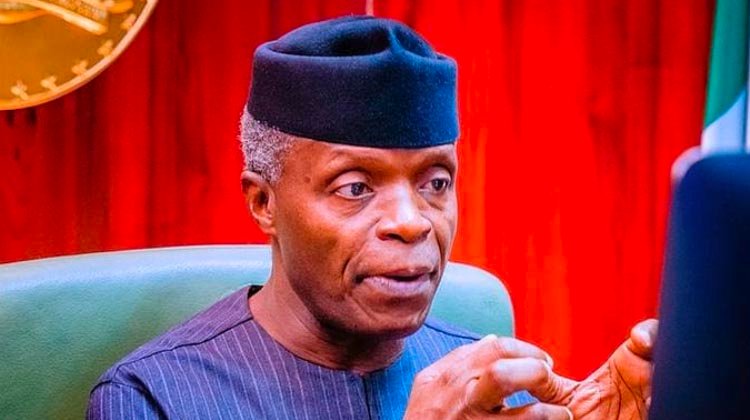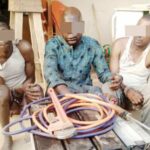
Vice President Yemi Osinbajo has said that the Nigerian justice system is a public resource and does not belong to the legal profession. Rather, legal practitioners are only custodians, not owners.
Osinbajo stated this on Saturday evening at the Body of Senior Advocates of Nigeria Annual Dinner and Scholarship Awards, which was held at the Lagos Continental Hotel.
Senior Special Assistant to the Vice President on Media and Publicity, Laolu Akande, disclosed this in a statement he signed late Sunday titled ‘Nigeria’s justice system belongs to the people, not the legal profession’.
According to the Vice President, as custodians of justice and fairness in society, the role of the Nigerian Bar goes beyond the development of an effective and efficient justice sector, it must also be at the forefront of championing reforms and deepening discourse that will continually uphold its excellence and prestige, and the rule of law.
He said “Our system of justice is a public resource, it does not belong to the legal profession, it does not belong to the bar or to the bench. It belongs to the people.
“We are paid operators of a service that our constitution created to resolve their disputes and give justice. We are custodians, not owners. When this public resource is not working effectively on account of delays, or it is being discredited by corruption, we the operators have a moral, legal and civic obligation to fix it.”
Referencing a quote from the Bible, Osinbajo added that “we must not become defensive or thin-skinned. If we do not fix it, we would have failed in our most important task; we would have failed to speak up for the voiceless and vulnerable.
“Every one of us seated here today knows that there is a lot wrong with our system of justice today, history beckons us to fix it.
“Some of the reputational damage suffered in recent times by our profession and our system of justice is one that could have been avoided with rigorous and sustained introspection on our part.”
He observed that one of the ways to improve the standard of legal practice in the country was to enhance the quality of legal education, including adopting a hybrid approach, so as to prepare the next generation of legal minds for the future.
For instance, “there is no country with the number of law graduates we have yearly that provides in-person lectures and accommodation for those taking bar examinations.
“Generally speaking, professional examinations do not provide residential training. This is why I think the suggestion by some that we scrap residential training and enable law graduates to register online for bar exams, be provided online resources for training, mock trials, appearances in court, how to make applications in court, can be put on video and this will even enable the student play it over and over for mastery.”
While he noted the efforts of the Nigerian Bar Association in conscientiously advocating and supporting continuous legal education for legal practitioners, he opined that there was a need to do more, especially using the BOSAN platform.
The Vice President further said that “a partnership of BOSAN, the Council for Legal Education and some faculties of law on a pilot basis for the provision of additional instructional support will not only be useful to the students of those universities, but also to some of the law teachers who may require mentorship.”
He also urged BOSAN to ensure continuous discipline among its members, noting that “the strength of character and integrity of our body could, to a large extent, be called into question by the transgressions of a few.
“We, as a body, are in better stead to internally ensure that our members abide by the highest standard of probity. I think it is time to commit to calling out those whose actions demean the rank of senior advocate and ensure that they are brought before the appropriate disciplinary body,” he added.
The Vice President congratulated the newly preferred Senior Advocates for the attainment of the prestigious rank, including Prof. Ajagbe Oyewo, whom he praised for his resilience and persistent determination in the pursuit of excellence that had him donning the silk at the age of 91.
In attendance were Former Head of State, General Abdulsalami Abubakar (retd.) who delivered the keynote lecture, Chief Justice of Nigeria, Ibrahim Muhammad, who was represented by Justice Kudirat Kekere-Ekun, and the first female Senior Advocate of Nigeria, Mrs Folake Solanke.
Copyright PUNCH.
All rights reserved. This material, and other digital content on this website, may not be reproduced, published, broadcast, rewritten or redistributed in whole or in part without prior express written permission from PUNCH.
Contact: [email protected]





